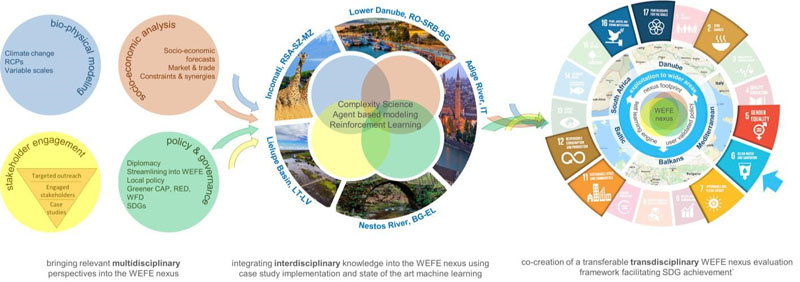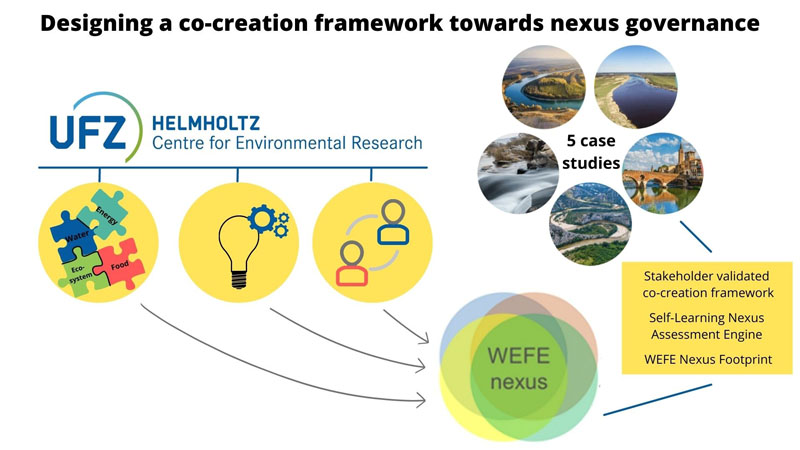
NEXOGENESIS
Facilitating the next generation of effective and intelligent water-related policies utilising artificial intelligence and reinforcement learning to assess the water-energy-food-ecosystem (WEFE) nexus
Personnel
Project
partners
IHE Delft, KWR Water Research Institute, EURAC Research, CMCC, EURECAT, Wageningen Research, National Technical University of Athens, Ca’Foscari University, University of Tours, Uppsala University, University of Thessaly, Baltic Environmental Forum, Jones and Wagener, GAC, Business Development Group, Tamara Avellan, Municipality of Nestos, Municipality of Gotse Delchev and Water Europe
Duration
09/2021 − 08/2025
Status
Horizon 2020 project, Grant Agreement no. 101003881
Budget UFZ
241,782€
Outline
The complex interactions in the water-energy-food-ecosystem (WEFE) nexus require holistic and cross-sectoral governance and policies. The project NEXOGENESIS, funded by the European Commission, aims to improve policies for effective resource management, increase synergies between sectors and promote cooperation among stakeholders. NEXOGENESIS aims to develop a coherent nexus framework for the assessment of potential impact pathways of implementing new policy objectives in the nexus, including:
- biophysical and socio-economic modelling;
- stakeholder engagement;
- validation of NEXOGENESIS outputs and;
- the use of the latest artificial intelligence techniques.

The intertwined character of the WEFE nexus
WEFE sectors are inherently intertwined. Water supply uses energy, hydropower generation alters ecosystem functioning, the production of energy crops conflicts with food production targets, irrigated agriculture uses water resources, expansion in agriculture leads to water pollution, which in turn reduces the quality of ecosystem services − to only name a few. Further, the WEFE nexus is affected by other drivers, for example, changes in climate, socio-economic development, transboundary conflicts, stakeholder behaviour, land use change and urban growth.
NEXOGENESIS seeks to fill the gap in understanding the mutual response of biophysical and human system components to policy implementation to optimise nexus policy formulation and integration for effective streamlining of water-related policies while addressing resource, transboundary, and stakeholder concerns. The project results contribute to the water-related POF IV research of research unit “Environment and Society”.
Main NEXOGENESIS Outputs
The project has three main outputs, the NEXOGENESIS self-learning nexus assessment engine (SLNAE), a WEFE Nexus Footprint, and user-validated policy packages. By exploiting Artificial Intelligence, the SLNAE allows scenario modelling to assess nexus-wide impacts of policy implementation. The SLNAE will provide a series of actions to increase nexus performance, deal with new situations, acquire replicable scenario-specific knowledge, and result in recommendation that will be validated by stakeholders. The WEFE Nexus Footprint represents a composite indicator that provides a quantitative means to evaluate trade-offs when achieving sustainable development, which will be updated with stakeholders. The user-validated policy packages will be developed per each of the five case studies included in the project:
- CS1: Nestos River Basin (Greece-Bulgaria),
- CS2: Lielupe River Basin (Latvia-Lithuania),
- CS3: Lower Danube River Basin (Romania-Serbia-Bulgaria),
- CS4: Adige River Basin (Italy),
- CS5: Inkomati-Usuthu Water Management Area (South Africa-Eswatini-Mozambique).
The user-validated policy packages aim at streamlining water-related policy into the nexus, accounting for climate, socio-economic, behavioural, scale, and transboundary issues, assisting market and trade negotiations and water diplomacy activities.

UFZ in the co-lead of Work Package 1
The Ufz is commissioned as co-leader of Work Package 1 (WP1), responsible for the co-creation of WEFE nexus governance and water policy streamlining. WP1 is divided into five tasks among which Ufz holds the lead of two (T1.1 and T1.5).
T1.1 aims at designing a conceptual and analytical co-creation framework towards nexus governance. By reviewing current theoretical, analytical and methodological approaches for nexus governance, and building on current approaches to develop a conceptual and analytical framework for co-creation of nexus governance, NEXOGENESIS will incorporate current debates in water governance theory, transboundary water management literature and conflict management. The Ufz supports proposing both an analytical and practical governance framework that embraces holistic WEFE nexus resource management in multi-layered political and administrative contexts. The framework will guide resource management organisations such as river basin organisations to identify and address problems from a nexus perspective as well as to identify the governance reforms needed internally and in the river basin to move away from a silo management approach. The framework will outline a comprehensive approach to map, assess and manage governance and policy synergies and trade-offs in the WEFE nexus.
By leading T1.5, the Ufz helps setting guidelines for the design and implementation of the co-creation framework for nexus governance. Part of the task is to review the initial co-creation framework for nexus governance in light of lessons learned from the case studies and to deliver a guidance for co-creation of nexus governance. The guidance will codify the local co-creation process in detail so as to be reproducible, including the stakeholder preferences and ambitions assessment, the governance assessment, policy analysis, and the water streamlining approach. In summary, the guidance for co-creation of WEFE nexus governance at the water management scale aims at supporting resource management organisations to design, assess and embed institutional, policy and governance reforms towards WEFE nexus management.
Publications
Hüesker, F., Moss, T. (2015), The politics of multi-scalar action in river basin management: Implementing the EU Water Framework Directive (WFD), Land Use Policy, 42, 38-47.
Moss, T., Hüesker, F. (2019), Politicised nexus thinking in practice: Integrating urban wastewater utilities into regional energy markets, Urban Studies, 56 (11), 1-17.
Sievers, E., Zielhofer, C., Hüesker, F. (2021), Management of Global Warming Effects in the European Water Framework Directive: Consideration of Socio-Ecological System Features in the Elbe River Basin District, Sustainability, 13 (16), 1-20.
